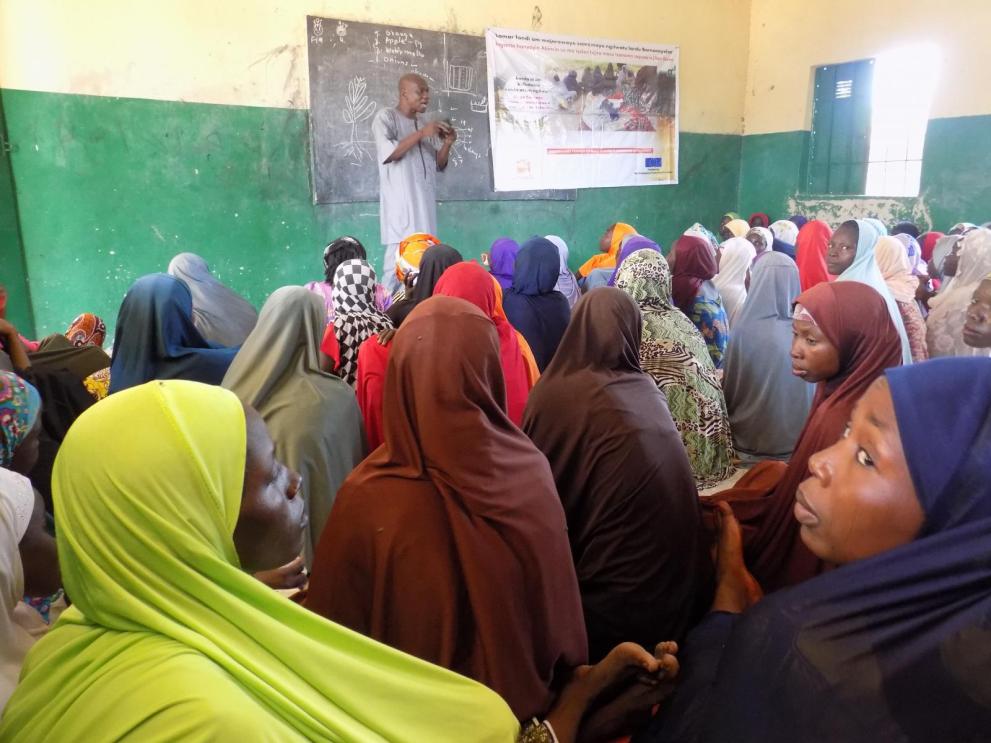
Jummai Abba had to flee her hometown in Nigeria when violence broke out. Today, she is an entrepreneur and teaches other displaced women vocational skills.
Sitting on a tall metal stool, her left foot on the pedal and right hand on the wheel of her sewing machine, 37-year-old Jummai Abba is showing a group of women how to stitch locally sourced fabrics to make throw pillows.
“I learnt how to sew as a young girl. I can make different designs of bags, shoes, and other items” - she says.
Abba and her two-year-old child fled their village Gulak in Adamawa State, northeast Nigeria, following intense fighting between armed opposition group and government forces. Abba, who was two months pregnant and alone with her child, trekked several days through dangerous bush paths until they arrived at Maiduguri town, covering a distance of over 173 km.
Abba is among the nearly 2 million people affected by displacement in northeast Nigeria following ten years of violence in the region that has killed over 30,000 people and injured more than 100,000. Three quarters of those displaced by the crisis found shelter with host communities who are among the world’s poorest people.
Providing start-up grants and training
The Norwegian Refugee Council (NRC), with the support of the European Union through the EU Emergency Trust Fund for Africa, is responding to the humanitarian needs in northeast Nigeria, while also working to help people regain livelihoods. While distributing food and other relief supplies to displaced people, we provide micro-enterprise training programme. Those actions are funded by the European Union.
Abba was among over 2,000 displaced people trained and supported to start and scale up their small businesses. Since she bought a sewing machine with a seed fund from NRC, the mother of eight has been very busy meeting the demands of her ever-growing base of customers. “I made different products and displayed them in front of my house, and people kept coming to buy them and ask for more” - she says.
Teaching women her trade
Now Abba herself is helping new entrepreneurs get their start. Following several training requests, she began enrolling displaced women who were interested in learning how to sew and sell their products. “Hundreds of women including those in the host communities showed interest in my training programme” - she says.
Despite introducing a NGN 3,000 ($8) registration fee, the number of prospective trainees kept growing. To manage the high number of trainees, Abba teaches two classes a day – morning and evening sessions. Overall, she has trained more than 200 displaced women in Maiduguri.
“In one month, over 40 displaced women graduate from my training programme” - she says.
Now she can save money for her husband to scale up his small paint business and to send her eldest child to the university.
“I don’t want to be idle”
Trainees at Abba’s workshop are displaced women, who often currently depend on aid from the government, philanthropists, local and international non-governmental organisations.
Though she knew how to use the sewing machine before coming to Maiduguri, 27-yearold Asabe Yakubu, who fled from her village Chibok, signed up for Abba’s workshop to enhance her skills in line with the demands of customers in an urban area. She plans to start production of handbags and other items once she completes her training.
“I don’t want to be idle; that is why I came here to learn and improve my sewing skills” - she says.
NRC and the EU supported Jummai Abba to scale-up her vocation training for other women affected by displacement in Maiduguri, Nigeria. Thanks to funding from the European Union.
Details
- Publication date
- 6 February 2018
- Region and Country
- Nigeria
- Thematic
- Strengthening resilience of communities
- Partner
- Norwegian Refugee Council
- Danish Refugee Council
- International Rescue Committee
